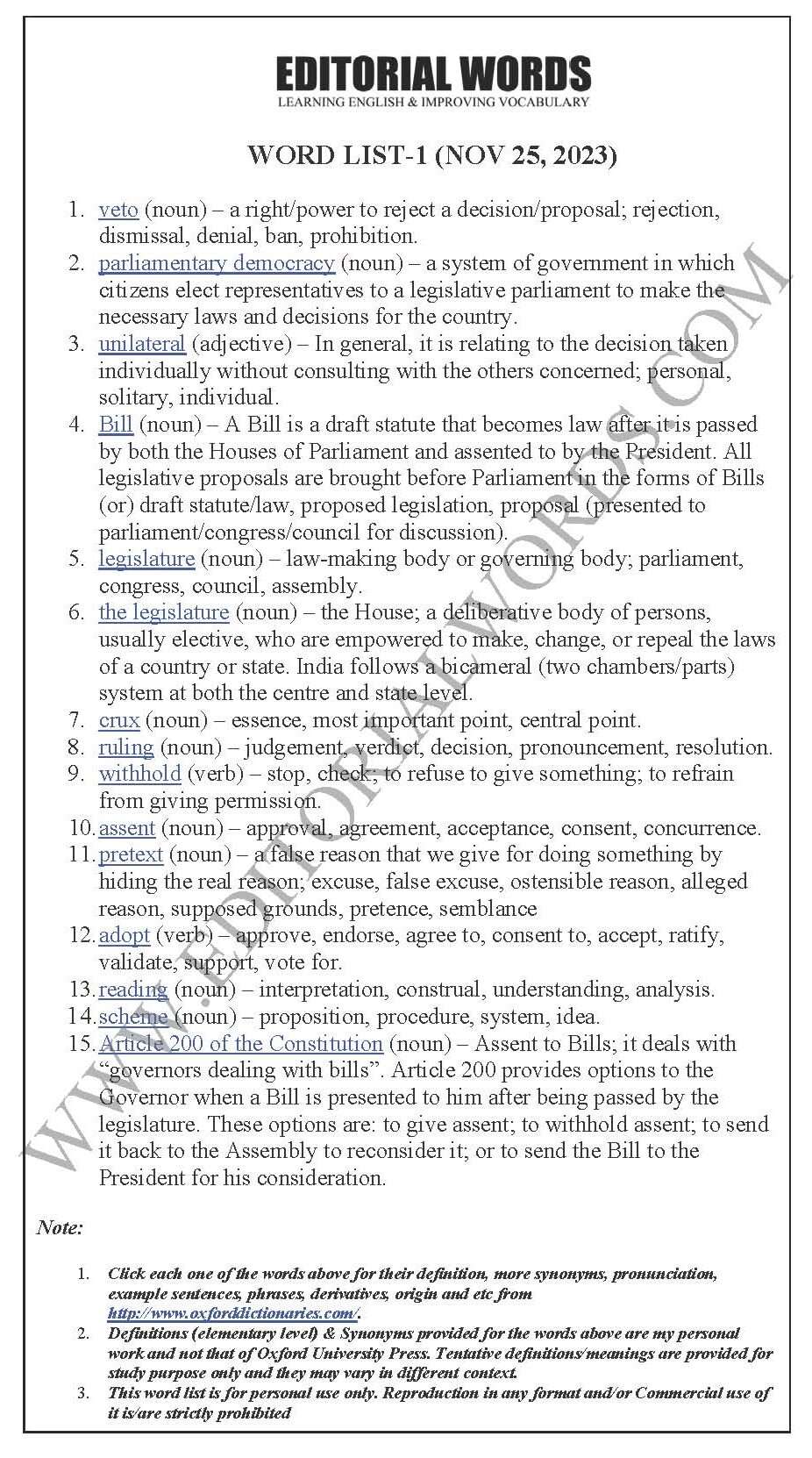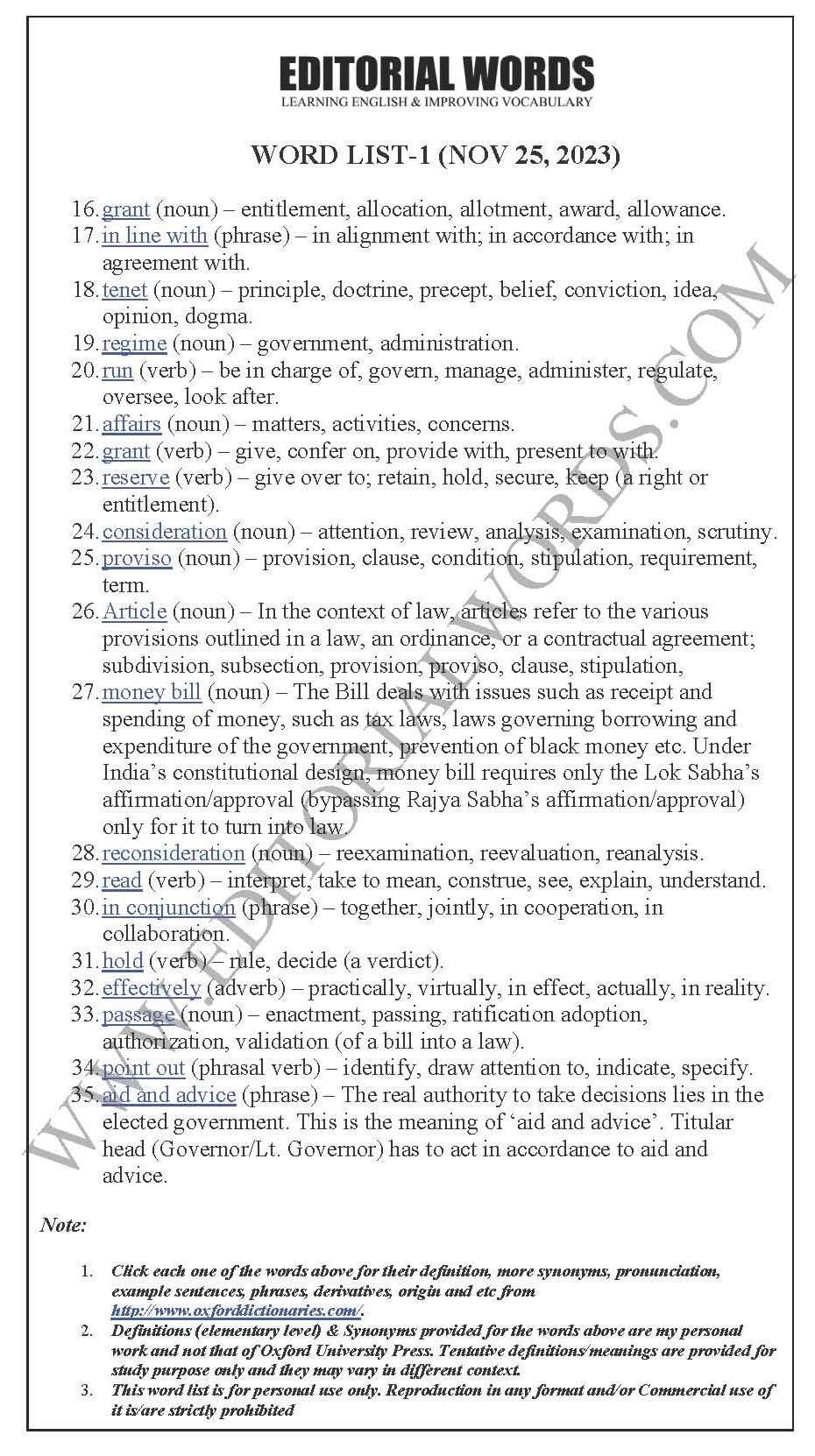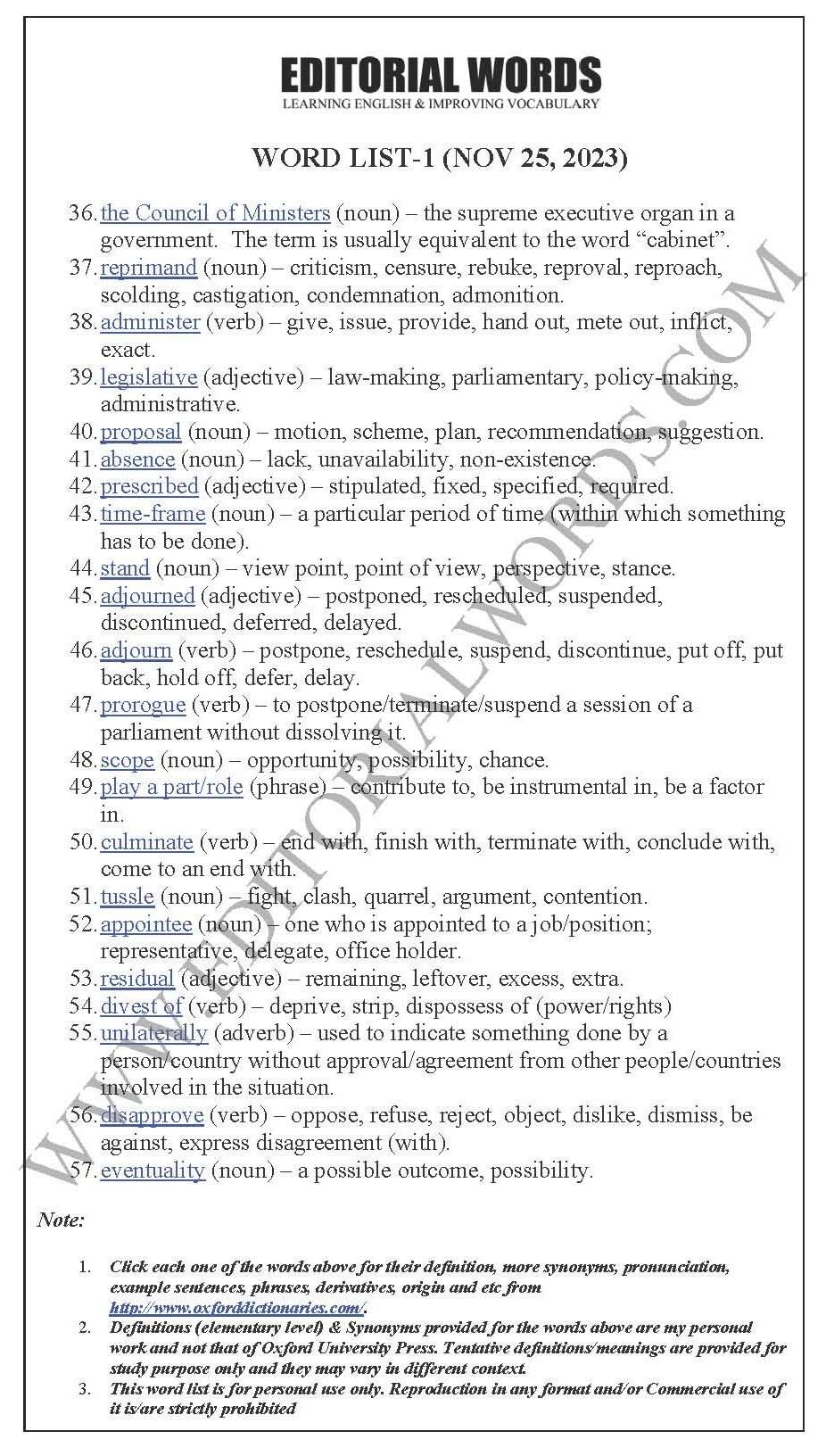The Hindu Editorial (No vote for veto) – Nov 25, 2023
To read this article, click “The Hindu”.
This preview is provided here with permission.
Courtesy: The Hindu
The Hindu Editorial (No vote for veto) – Nov 25, 2023:
- veto (noun) – a right/power to reject a decision/proposal; rejection, dismissal, denial, ban, prohibition.
- parliamentary democracy (noun) – a system of government in which citizens elect representatives to a legislative parliament to make the necessary laws and decisions for the country.
- unilateral (adjective) – In general, it is relating to the decision taken individually without consulting with the others concerned; personal, solitary, individual.
- Bill (noun) – A Bill is a draft statute that becomes law after it is passed by both the Houses of Parliament and assented to by the President. All legislative proposals are brought before Parliament in the forms of Bills (or) draft statute/law, proposed legislation, proposal (presented to parliament/congress/council for discussion).
- legislature (noun) – law-making body or governing body; parliament, congress, council, assembly.
- the legislature (noun) – the House; a deliberative body of persons, usually elective, who are empowered to make, change, or repeal the laws of a country or state. India follows a bicameral (two chambers/parts) system at both the centre and state level.
- crux (noun) – essence, most important point, central point.
- ruling (noun) – judgement, verdict, decision, pronouncement, resolution, decree.
- withhold (verb) – stop, check; to refuse to give something; to refrain from giving permission.
- assent (noun) – approval, agreement, acceptance, consent, concurrence.
- pretext (noun) – a false reason that we give for doing something by hiding the real reason; excuse, false excuse, ostensible reason, alleged reason, supposed grounds, pretence, semblance
- adopt (verb) – approve, endorse, agree to, consent to, accept, ratify, validate, support, vote for.
- reading (noun) – interpretation, construal, understanding, analysis.
- scheme (noun) – proposition, procedure, system, idea.
- Article 200 of the Constitution (noun) – Assent to Bills; it deals with “governors dealing with bills”. Article 200 provides options to the Governor when a Bill is presented to him after being passed by the legislature. These options are: to give assent; to withhold assent; to send it back to the Assembly to reconsider it; or to send the Bill to the President for his consideration.
- grant (noun) – entitlement, allocation, allotment, award, allowance.
- in line with (phrase) – in alignment with; in accordance with; in agreement with.
- tenet (noun) – principle, doctrine, precept, belief, conviction, idea, opinion, dogma.
- regime (noun) – government, administration.
- run (verb) – be in charge of, govern, manage, administer, regulate, oversee, look after.
- affairs (noun) – matters, activities, concerns.
- grant (verb) – give, confer on, provide with, present to with.
- reserve (verb) – give over to; retain, hold, secure, keep (a right or entitlement).
- consideration (noun) – attention, review, analysis, examination, scrutiny.
- proviso (noun) – provision, clause, condition, stipulation, requirement, term.
- Article (noun) – In the context of law, articles refer to the various provisions outlined in a law, an ordinance, or a contractual agreement; subdivision, subsection, provision, proviso, clause, stipulation,
- money bill (noun) – The Bill deals with issues such as receipt and spending of money, such as tax laws, laws governing borrowing and expenditure of the government, prevention of black money etc. Under India’s constitutional design, money bill requires only the Lok Sabha’s affirmation/approval (bypassing Rajya Sabha’s affirmation/approval) only for it to turn into law.
- reconsideration (noun) – reexamination, reevaluation, reanalysis.
- read (verb) – interpret, take to mean, construe, see, explain, understand.
- in conjunction (phrase) – together, jointly, in cooperation, in collaboration.
- hold (verb) – rule, decide (a verdict).
- effectively (adverb) – practically, virtually, in effect, actually, in reality.
- passage (noun) – enactment, passing, ratification adoption, authorization, validation (of a bill into a law).
- point out (phrasal verb) – identify, draw attention to, indicate, specify, mention.
- aid and advice (phrase) – The real authority to take decisions lies in the elected government. This is the meaning of ‘aid and advice’. Titular head (Governor/Lt. Governor) has to act in accordance to aid and advice.
- the Council of Ministers (noun) – the supreme executive organ in a government. The term is usually equivalent to the word “cabinet”.
- reprimand (noun) – criticism, censure, rebuke, reproval, reproach, scolding, castigation, condemnation, admonition.
- administer (verb) – give, issue, provide, hand out, mete out, inflict, exact.
- legislative (adjective) – law-making, parliamentary, policy-making, administrative.
- proposal (noun) – motion, scheme, plan, recommendation, suggestion.
- absence (noun) – lack, unavailability, non-existence.
- prescribed (adjective) – stipulated, fixed, specified, required.
- time-frame (noun) – a particular period of time (within which something has to be done).
- stand (noun) – view point, point of view, perspective, stance.
- adjourned (adjective) – postponed, rescheduled, suspended, discontinued, deferred, delayed.
- adjourn (verb) – postpone, reschedule, suspend, discontinue, put off, put back, hold off, defer, delay.
- prorogue (verb) – to postpone/terminate/suspend a session of a parliament without dissolving it.
- scope (noun) – opportunity, possibility, chance.
- play a part/role (phrase) – contribute to, be instrumental in, be a factor in.
- culminate (verb) – end with, finish with, terminate with, conclude with, come to an end with.
- tussle (noun) – fight, clash, quarrel, argument, contention.
- appointee (noun) – one who is appointed to a job/position; representative, delegate, office holder.
- residual (adjective) – remaining, leftover, excess, extra.
- divest of (verb) – deprive, strip, dispossess of (power/rights)
- unilaterally (adverb) – used to indicate something done by a person/country without approval/agreement from other people/countries involved in the situation.
- disapprove (verb) – oppose, refuse, reject, object, dislike, dismiss, be against, express disagreement (with).
- eventuality (noun) – a possible outcome, possibility.
Note :
1. Click each one of the words above for their definition, more synonyms, pronunciation, example sentences, phrases, derivatives, origin and etc. from http://www.oxforddictionaries.com/.
2. Definitions (elementary level) & Synonyms provided for the words above are my personal work and not that of Oxford University Press. Tentative definitions/meanings are provided for study purposes only and they may vary in a different context.
3. This word list is for personal use only. Reproduction in any format and/or Commercial use of it is/are strictly prohibited.
The Hindu Editorial (No vote for veto) – Nov 25, 2023:



“Phrasal Verbs” We Learnt Last Week
“Idioms & Phrases” We Learnt Last Week
“Important Definitions” We Learnt Last Week
Recent Word Lists For The Hindu Editorial Articles

In a parliamentary democracy, Governors do not have a unilateral veto over Bills passed by the legislature. This is the crux of the Supreme Court’s ruling in a case arising from Punjab after Governor Banwarilal Purohit withheld assent to some Bills… For further reading, visit “The Hindu”. Below is today’s word list-1 for The Hindu Editorial (No vote for veto) – Nov 25, 2023.